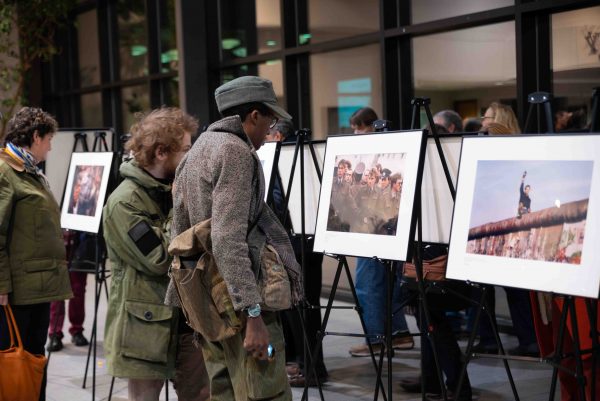

Event attendees had the opportunity to view a collection of photographs documenting the fall of the Berlin Wall. The photos will be on display in the second floor of the Student Center until Dec. 15. Lily Merritt | Washtenaw Voice
By Brian Babcock | Staff Writer
and Lilly Kujawski | Editor
Recently, WCC marked the 30th anniversary of the fall of the Berlin Wall. Hundreds gathered in Towsley Auditorium on Nov. 6 to hear first-hand recollections from a WCC faculty member.
Elisabeth Thoburn, a humanities and art instructor, was born in the small industrial city of Halle, Germany. She said the wall seemingly “came up overnight” 60 years ago. Concrete slabs—almost 12 feet tall—ran north to south, splitting Berlin in two. The wall stood for nearly three decades, dividing families and friends. Thoburn lived through this time and experienced life on the wall’s eastern side.
Thoburn said in her youth she heard the wall was meant to keep fascists out of East Berlin and East Germany—but in reality it was meant to prevent East Berliners from escaping to the West.
Escape, she said, was a daring and many times deadly ordeal. Thoburn said she had her share of encounters with communist police efforts after moving to Dresden, Germany.
“I was built into the wall; the wall was always a reality for me,” she said.
Fortunately for Thoburn, in 1985 she was able to leave East Germany after meeting her future husband, a German language student on an exchange from Kalamazoo College. Both knew that in order for marriage to work out, she would have to leave and come to the U.S. After applying for a license to marry and a year of waiting, she had a passport to leave East Germany.
Four years later, the wall couldn’t hold back any more East Germans. Thousands of grassroots citizens turned into hundreds of thousands of peaceful protesters.
Thoburn said there are literal walls—such as the Berlin Wall—as well as figurative walls in society. She said one of these walls is political polarization in the United States.
In the question and answer portion of her talk, Thoburn offered some opinions on the current environment at WCC. She warned academic institutions tend to be liberal-leaning, and teachers should welcome different opinions and perspectives in the classroom.
“The purpose of education is not to clone people who think like us,” Thoburn said. “The real purpose of education is to grow people who can think independently and analytically and take the power of knowledge wherever they want to.”
She added that the right to vote is a privilege, and today some people in the United States are willing to throw it away because they haven’t had to fight for it.
Thoburn told the Voice that she generally considers WCC a wall-free place.
“We are inclusive; we are open,” Thoburn said.
WCC has broken down many walls and offered “nothing but doors,” according to Randall Moog, 30, an engineering student who was at the event.
A collection of photographs documenting the fall of the Berlin Wall are on display in the second floor of the Student Center. The exhibition will be up until Dec. 15.
Below are recent employment want ads that have been posted with WCC Center for Career…
Zakeria Almajrabi | Photo and Writing Contributor TEDxWCC is an annual event hosted towards the…
Some policies under review amid federal changes Lily Cole | Editor ONGOING COVERAGE At the…
5 first place honors received, including general excellence Alice McGuire | Deputy Editor On April…
Possible cuts, addition to be discussed at next meeting Yana McGuire | Staff Writer WCC’s…
Zachary Cleveland | Contributor Upwards of 1,500 Washtenaw County residents gathered under a chilly grey…